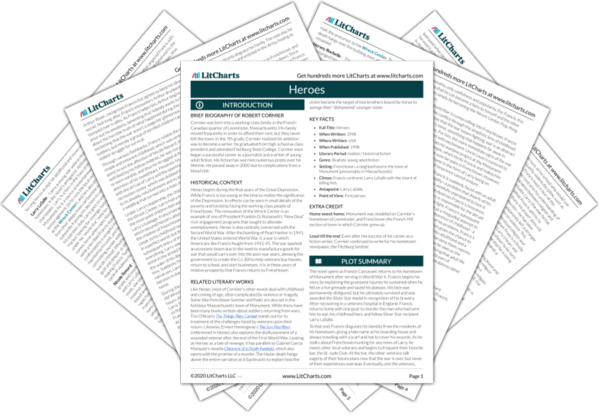Through the lens of Francis’s narration, Cormier presents a world that is suffused with religion, and the near-constant presence of religion shines a light, in particular, on the relationship between religion and suffering. The most notable manifestation of this relationship is the association of religion with violence. From a young age, violence and religion were linked in Francis’s mind, particularly due to the behavior of the nuns at his school who would use their religious authority to justify violent discipline, such as hitting students with rulers. Francis lived in fear of this violence, which in turn became central to his understanding of religion. After the war, this association between religion and violence continues, as Francis includes Larry (the man he has set out to murder) in his prayers. While Francis admits to feeling guilty about that part of his litany, his prayer does not change his mind about his intent to murder—he has been taught to pray for his enemies, which apparently left a stronger impression than his religion’s prohibition on violence. This makes sense, since Larry has always understood religion and violence to be compatible. Furthermore, when Francis is finally face-to-face with Larry, he aims his pistol at Larry’s heart and tells him to say his prayers. Since religion was shown to be such a formative part of Francis’ life, readers assume that he is being sincere; he believes that this act of violence demands a religious component.
Even if Cormier had presented religion as promoting peace and forgiveness instead of violence, Heroes suggests that religion alone would not be a powerful enough force to change a person’s violent behavior. This is because Cormier sees religion as so common that people have become desensitized to it. For example, after the Wreck Center closes, the children of Frenchtown hang out either in the schoolyard of St. Jude’s or in front of the town drugstore. By making the churchyard and drugstore equivalent, Cormier implies that the children do not consider religious institutions to be more serious or important places than anywhere else. This banality is also evident in Francis’ speech patterns; throughout his narration, Francis uses religious imagery when religion doesn’t seem particularly fitting or relevant. For example, when he defeats Larry in a high-stakes game of Ping-Pong, he turns to see a joyous Nicole, describing her as having her “hands joined together as if in prayer, eyes half closed as if making herself an offering.” By associating the act of prayer with a trivial, secular thing like a Ping-Pong game, Cormier is using—or perhaps intentionally overusing—this intense religious imagery to show that for Francis, religion is indeed as seemingly banal as a Ping-Pong tournament. Additionally, like a Ping-Pong tournament, religion is not morally forceful enough to make Francis contemplate his behavior or ethics.
Thus, by portraying religion as both linked with violence and as a mundane part of life, Cormier argues that religion is unable to provide solutions to the suffering found in the lives of the characters. For instance, Nicole demonstrates the ineffectiveness of religion when she withdraws into the nun’s convent after being raped. Instead of taking the holy vows or even using religion to work through her trauma, she reveals that she was simply hiding among the nuns until her family left Monument for good. For her, religion was literally only a temporary distraction from her suffering. In a similar manner, Francis demonstrates the ineffectiveness of religion when he chooses the church steeple as the location for his first suicide attempt, taking away any possible symbolism of the church as a sanctuary or a place of salvation or redemption. Furthermore, Cormier heightens the sense of the impotence of religion by showing GI’s using empty religious language in the face of horrors. When Francis and his platoon sweep through an occupied village, one soldier says, “Jesus”—according to Francis, the entire platoon knew that the soldier really meant “I’m scared.” Here, there is no expectation of receiving any aid or comfort by invoking religion. In fact, this scene is an allusion to the 23rd Psalm, which is an invocation of God for protection, yet Cormier inverts this allusion by ending the scene with the death of two GI’s.
Ultimately, Cormier questions the usefulness of a religion that is not only incapable of mitigating human suffering, but can also at times create it. Thus, in a world where suffering is the norm and religion is inseparable from suffering, it logically follows that religion will eventually be normalized to the point of becoming mundane. It is important to note, however, that Cormier does not outright argue that religion is pointless. Instead, he uses individual characters’ actions and thoughts to offer insights into the relationship between religion and human suffering as seen through the lens of the sufferers. Like with his arguments about heroism, Cormier comes just shy of any definitive proclamations, leaving the reader to ascertain religion’s value, or lack thereof, for themselves.
Religion ThemeTracker

Religion Quotes in Heroes
"Are you all right?" I asked. “No, I'm not all right" she answered anger flashing in her eyes. "I hurt. I hurt all over." I could only stand there mute, as if all my sins had been revealed and there was no forgiveness for them.
I could not die that way. Soldiers were dying with honor on battlefields all over the world. Noble deaths. The deaths of heroes. How could I die by leaping from a steeple? The next afternoon I boarded the bus to Fort Delta, in my pocket the birth certificate I had altered to change my age, and became a soldier in the United States Army.











